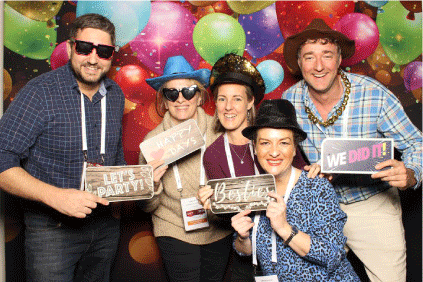ASM 2024 Brisbane
Ulrike Kappler AA
The ASM Annual Scientific Meeting, ‘ASM 2024’, was held in the Brisbane Exhibition and Convention Centre from 1 to 4 July 2024. We welcomed more than 560 delegates and 30 trade exhibitors to Brisbane for this conference, which brings together microbiologists from all areas of microbiology each year. ASM 2024 was held together with two satellite meetings, Clinicon that specialises on clinical microbiology research and EduCon that provides a forum for teachers in microbiology.
Despite the uncharacteristically bad weather we experienced in early July, ASM 2024 was a great event with delegates enjoying the diverse lectures, presentations and workshops on offer. In breaks, it was wonderful seeing delegates busy catching up with colleagues and friends, discussing science and expanding their network meeting new people.
The conference kicked off with the presentation of ASM awards, followed by an industry-focussed session organised by Assoc. Prof. Lea-Ann Kirkham (The University of Western Australia) that featured Erin Brazel, this year’s winner of the ASM Industry Engagement Award and an excellent panel of four speakers working in different industries. The four panellists highlighted that none of them had specifically targeted a career in industry, but all had taken different routes into microbiology-related roles in government bodies and companies, where they make particular use of networking skills as well as diverse skills they developed during their studies to fulfil very different leadership roles.
Further, program highlights were the Rubbo Oration, where Prof. Matthias Boll from the University of Freiburg (Germany) showcased how basic research on bacteria living in anaerobic environments can lead to commercial applications in nutraceuticals and bioprocessing, and the biannual Snowdon Oration presented by Prof. Jessica Blair (University of Birmingham, UK) who discussed the ‘ins and outs’ of bacterial efflux pumps in antimicrobial resistance. The 2024 ASM distinguished orator, Prof. Mark Walker (The University of Queensland) presented his fascinating research into viable targets for Group A Streptococcus vaccines.
Over the 4 days of the conference, delegates attended more than 80 talks and presentations, including over 72 presentations in research symposia covering diverse topics in microbiology. Additionally, more than 120 posters were presented by microbiologists of all career stages at the two poster sessions held on Monday and Tuesday night. The program also included workshops by exhibitors, and on research integrity (delivered by Dr Cheryl-Lynn Ong, QIMR Berghofer), and Equity, Diversity and Inclusion (panel discussion hosted by Dr Yogitha Shrikantha, Monash University). Students were able to increase their professional networks during the annual Nancy Millis breakfast event that was attended by researchers from all career stages, and the work of our youngest generation of microbiologists was showcased during the Nancy Millis Award winner presentations.
On Tuesday night, we could see a glimpse of the future of Australian microbiology during the awards session where the 2024 Jim Pittard and Frank Fenner Awardees, Lucy Furfaro (The University of Western Australia), Leah Roberts (Queensland University of Technology), Daniel Mediati (University of Western Sydney), Freda Jen (Griffith University), Sam Forster (Hudson Institute of Medical Research) and Jeremy Barr (Monash University) presented their work and visions for the future.
Further highlights of ASM 2024 were the five plenary presentations that were kicked off by Prof. Chris Greening (Monash University) who took the audience on a journey to understand his work on bacteria able to live ‘on air’. Dr Marie Anne Chattaway (UK Health Security Agency, UK) presented a public health perspective to the audience with her work on outbreak tracing, including one where chocolate was the source of the outbreak. Implications of Staphylococcus infections and interactions between Staphylococcus and Pseudomonas in cystic fibrosis were discussed by Prof. Joanna Goldberg (Emory University, USA), and Prof. Mario Feldman (Washington University, USA) presented details of his work on outer membrane vesicles (OMVs) and the discovery of the first proteins required for OMV biogenesis in Bacillus thetaiotaomicron.

The ASM 2024 Local Organising Committee (LOC; pictured from left to right): Dr Timothy Wells (The University of Queensland), Prof. Ulrike Kappler (LOC Chair, The University of Queensland), Assoc. Prof. Johanna Kenyon (Griffith University), Dr Martina Jelocnik (University of the Sunshine Coast), Dr Andreas Kupz (Australian Institute of Tropical Health and Medicine), Assoc. Prof. Amy Jennison (Queensland Health) (not pictured).
After an exciting 3 days of science, ASM 2024 concluded with an inspiring presentation by Marco Vignuzzi (A*STAR, Singapore) that in tandem explored the evolution of viruses and of his career, encouraging all emerging microbiologists to find their niche and follow their inspiration. This uplifting presentation preceded the conclusion of the conference with the presentation of poster prizes, the FEMS and ASM co-sponsored best Early Career Researcher presentation awards and the inaugural Science communications ASM ‘X’ and ‘Flashstory’ awards.1 Mark Schembri, the ASM president, delivered the closing address, before announcing that the ASM 2025 conference will be held in Adelaide.
Thank you to all delegates and exhibitors for their time and participation in ASM 2024 and in making this conference such a great success.


